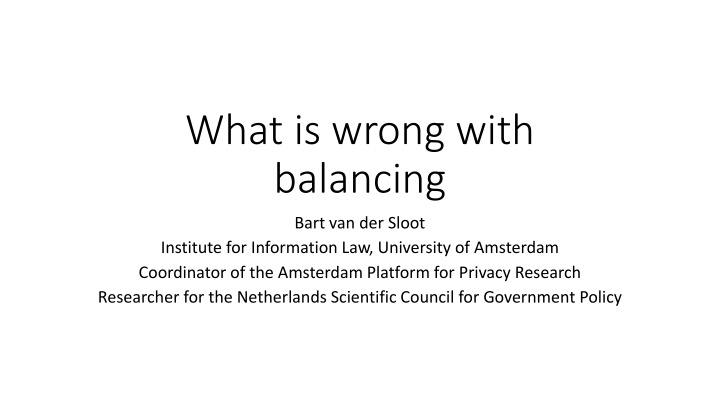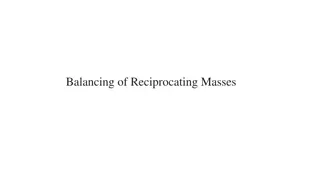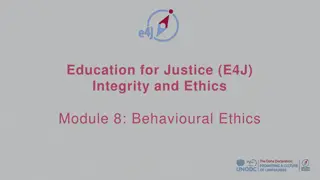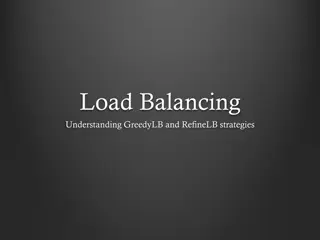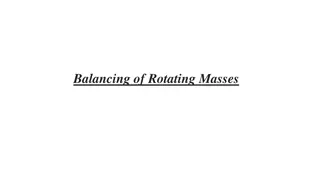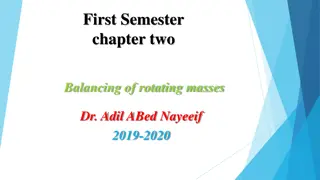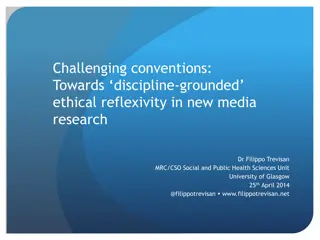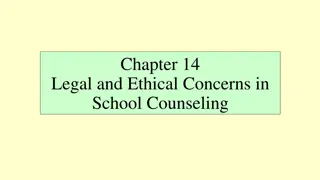The Problem with Balancing in Legal and Ethical Frameworks
The content discusses the limitations and drawbacks of the concept of balancing in legal and ethical contexts, focusing on the theoretical instability, moral implications, and intellectual laziness associated with it. Using the example of the Delfi case, it highlights the challenges and conflicts arising when balancing freedom of speech with other interests. The article critiques the lack of clear boundaries and relativistic nature of balancing, contrasting it with the absolute nature of human rights principles. It calls for a reevaluation of the use of balancing as a decision-making tool in complex societal issues.
Uploaded on Sep 30, 2024 | 2 Views
Download Presentation

Please find below an Image/Link to download the presentation.
The content on the website is provided AS IS for your information and personal use only. It may not be sold, licensed, or shared on other websites without obtaining consent from the author.If you encounter any issues during the download, it is possible that the publisher has removed the file from their server.
You are allowed to download the files provided on this website for personal or commercial use, subject to the condition that they are used lawfully. All files are the property of their respective owners.
The content on the website is provided AS IS for your information and personal use only. It may not be sold, licensed, or shared on other websites without obtaining consent from the author.
E N D
Presentation Transcript
What is wrong with balancing Bart van der Sloot Institute for Information Law, University of Amsterdam Coordinator of the Amsterdam Platform for Privacy Research Researcher for the Netherlands Scientific Council for Government Policy
Take home message Balancing is: (1) Theoretically unstable (2) Morally wrong (3) Intelectually lazy
Overview I will discuss three things: (1) Theoretical foundation of balancing (2) Delfi (3) Coty
Balancing (1) There is a lack of wheights and scales in the moral realm it is a metaphor that conceals emptyness (2) Human rights are about absolute and relative prohibitions while balancing fundamentally presuposes the relativity of interests (3) Human rights presume a quite narrow realm of priviliged and absolute interests while balancing in principle has no boundaries > everything could be wheighed and balanced, all interests could be taken into account (4) Human rights have as theorethical foundation (Kantian) deontology, while balancing has as fundament utilitarian ethics
Delfi Facts: Delfi publishes newsarticles on its websites and allows user comments Delfi publishes an in itself neutral and balanced article about a company which destroys ice-roads and L., the owner There are many user comments on Delfi in general and also with respect to this aritcle in particular L. asks Delfi (1) to remove 20 of the comments placed under this specific article and (2) to pay damages for defamation
Delfi Facts Delfi does the first, but refuses the second Most comments under this article where harmless and also most of the 20 comments in question where childish like I pee in your ear There is a discussion on national level about whether to apply the e- commerce directive or the freedom of speech doctrine Finally, the second approach is adopted and Delfi is ordered to pay damages. Delfi appeals to the ECtHR under article 10 ECHR against Estonia
Delfi What the Court should have done: (1) Determine whether an internet provider has a right to freedom of speech with regard to user comments (2) Determine whether there has been a limitation on this right by the national judgement and if so, determine if this limiation was: (a) prescribed by law (b) necesarry in a democratic society (c) aimed at one of the goals enlisted in article 10 para 2, namely the protection of reputation of others
Delfi Important background information: (1) The ECHR was orignally not about individual rights by natural persons it was orginally about public interests (2) The right to reputation has been moved to para 2 of Article 10 explicitly by the drafters of the Convention and not to Article 8 ECHR. (3) The drafters of the Convention did not envisage balancing they talked about necesity. The three step test is binary, not a relative one.
Delfi What the Court did not: It did not determine whether Delfi had a right to freedom of speech It did not assess whether the 20 comments did actually qualify as potentially damaging the reputation of others It did not assess whether the legal limitation of the right to freedom of speech was necesarry in a democratic society
Delfi What the Court did: Balance the freedom of expression under Article 10 ECHR of Delfi against the right to reputation of L., which it has determined falls under Article 8 ECHR It only answers the questions for the particulars of the case
Delfi What this means: It dodges all fundamental questions, which have societal relevance, and brings the whole case back to the particulars of the case It has a broader relevance to know whether internet intermediaries such as Delfi can invoke Article 10 ECHR with repsect to comments posted by users It has broader relevance to know whether a law such as under which Delfi was convicted is necesarry in a democratic society It has broader relevance to know wheter the types of comments complained of by L. can indeed by qualified as defamatory But it only determines in how far the interests of Delfi outwheigh those of L. in this particular case
Delfi What this means: The idea behind the Convention was to curtail the powers of the state they could only limit human rights if absolutely necessary, etc. This is a general interest Now, the Court involves a person who is not a party in the court case (namely L.) and attributes to it, on its own initiative, a similar human right as Delfi has invoked. All that is left for the court is not to assess on a fundamental level whether a human right is at stake and whether the limitation is necessary or not, but to balance two equally leveled interests (which have no priority of each other) by two private parties Note finally that this case fits in the idea of broadening scope of human rights, both at the side of the freedom of expression and on the side of the right to privacy
Coty Facts: A sells a good to B (the trademark holder of the good) via site C the payment is done via D (a german bank) The trademarkholder Coty writes to C to find out who the user of the acount is C provides the personalia of A. A however argues that it did not actually sell the product That is why Coty writes to D and asks who the owner is of the bank acount it transfered money to D refuses and refers to a law protecting professional secrecy A higher level Court agrees Coty takes the case against the Bank to the ECJ
Coty What the court should have done: Determine the social value of professional secrecy for banks, lawyers, docters, etc. Determine in which types of cases this fundamental societal value can be curtailed Determine whether the protection of a trademark and the violation of a trademark through an internet site qualifies as such
Coty What the Court did: Bring into play a non-party to the court case, namely A It attributes to Coty a fundamental right to the protection of property It attributes to A a fundamental right to data protection It balances the relative interests of A and Coty
Coty What this means: The societal interests in having professional secrecy is not at all discussed by the Court Rather, the role of the Bank, invoking professional secrecy, is substitued by the ECJ for A, who has a right to data protection Again, the Court brings a very difficult and fundamental question (should a bank have professional secrecy and if so, in which types of cases can it legtimately be curtailed) back to the particular interests of two private parties with respect to their equally important interests It does not in any way priorize certain interests over others It does not discuss the special role of data protection in the fundamental right framework
Coty What this means It does not discuss the special role of property rights in the fundamental rights realm It does not discuss the relation between intellectual rights and property rights It does not discuss in how for trademarks should be conceived as part of a fundamental right to property It does not assess the subsidiarity principle, namely with regard to the fact that Coty already had the name of A and could have gone to court. It merely argues that in so far the german provision should be read (of which it is uncertain) as an absolute right, this is in violation of the right to property by Coty
Final remark Not only is this approach theoretically wrong and misguided Not only do the Courts use the balancing approach as a way to dodge every moral decision Not only do the Courts use the balancing test to side step intellectually difficult questions But perhaps most importantly, decisions by the Court increasingly become redundant they have no other value than determinening the specific outcomes of the particular case at hand. It should not come as a surpise of course that there are so many cases before the courts The judgements do not give any principled decisions They do not give any further guidence for others how to determine the outcome of case They leave national courts and perhaps more importantly private parties such as internet providers having to deal with requests like those of L. or banks having to deal with requests like those of Coty with no further guidence This ensures legal insecurity and legal inequality
